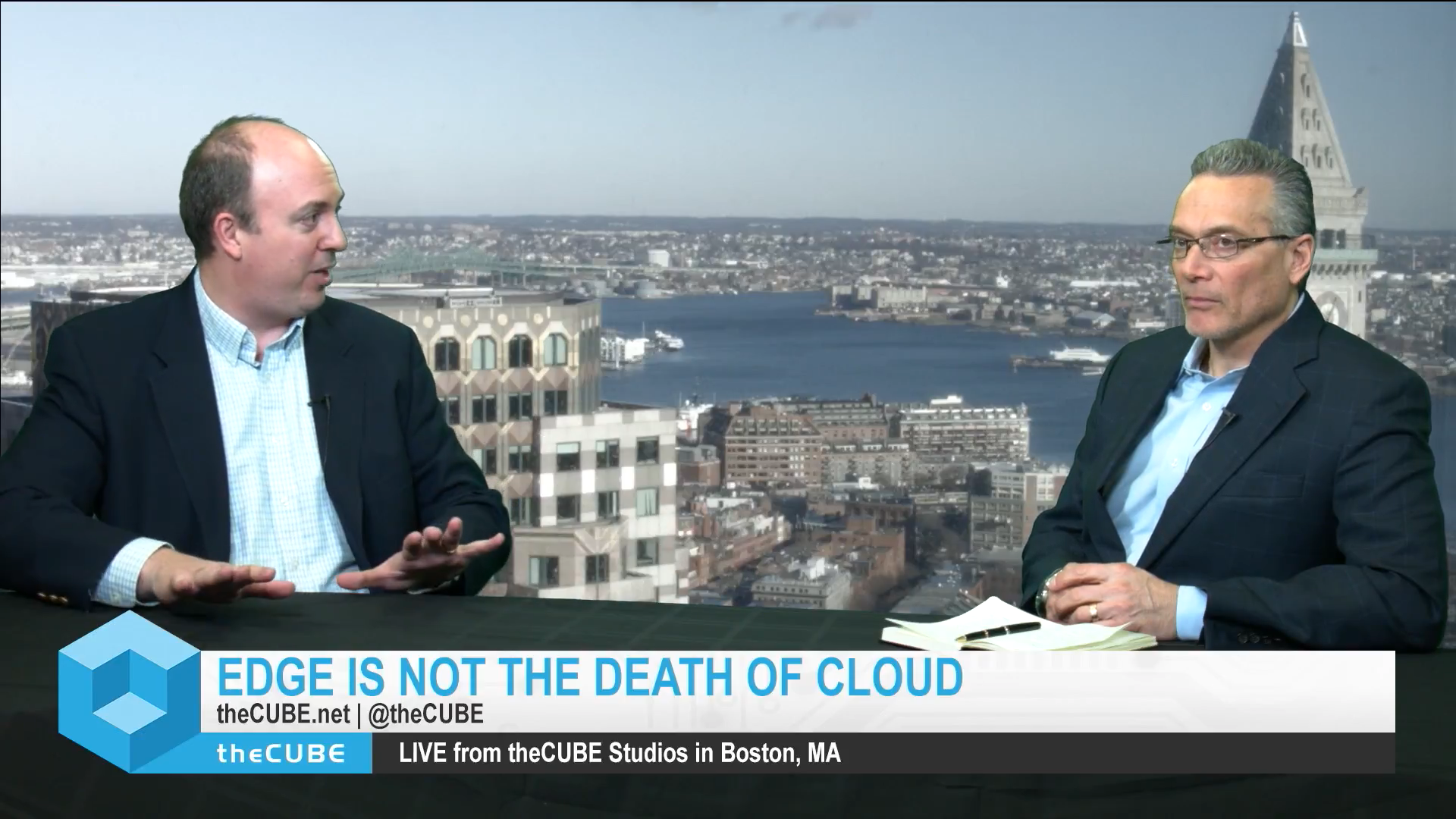 CLOUD
CLOUD
 CLOUD
CLOUD
 CLOUD
CLOUD
The impending death of the cloud computing has been a hot topic among venture capitalists and information technology industry analysts, including Peter Levine, general partner at Andreessen Horowitz LLC. “[The] sensor data explosion will kill the cloud,” Levine said in his talk “The End of Cloud Computing.”
The much-hyped growth of the “internet of things,” which is predicted to exceed 25 billion connected devices before the decade is up, lends urgency to the debate. Devices such as driverless cars require real-time data decisions that result in actions critical for user safety, but sending data from the edge of the network (the car, in this instance) to be processed in the cloud (a remote server) just isn’t practical because of latency, according to Levine. Ergo mors inevitabilis nubes. (Therefore, cloud dies.)
But is this false logic? Stu Miniman (@stu, pictured, left), senior analyst at Wikibon Inc. and co-host of theCUBE, SiliconANGLE Media’s mobile livestreaming studio, sees beyond the catchy headlines to the nuances of the relationship between cloud and edge computing. Wikibon has been tracking edge computing for many years, forecasting the growth of the industrial internet and the explosion of connected devices.
Miniman and Dave Vellante (@dvellante, right), chief analyst at Wikibon and co-host of theCUBE, met up for a special CUBE Conversation at the SiliconANGLE Media office in Boston, Massachusetts, to discuss the impact of edge computing on cloud computing and how infrastructure as a service is being affected by the growth of IoT.
“Will the activity that occurs at the edge actually drive more demand from the cloud?” Vellante asked.
“Absolutely,” Miniman replied, who doesn’t refute that critical, time-sensitive decisions need to be made at the edge, but sees opportunity for the cloud to continue as a lower-cost, secure space for data management, compute cycles and modeling.
“There’s going to be lots more devices at the edge, so huge opportunity, huge growth, intelligence all over the place. But in our viewpoint, it doesn’t mean that cloud goes away,” Miniman said.
Wikibon researchers have envisioned this interaction between the cloud and the edge as a three-tier data model with primary or raw data at the edge, secondary data for more complex events aggregated in a layer between the edge and the deep data center, and tertiary data, such as integration, modeling and management data in the cloud.
The pay-as-you-go cost benefits and flexibility of infrastructure as a service make it popular for IoT deployments, and when one thinks about cloud-based IaaS, they probably think Amazon Web Services, Inc. “Where is Amazon going to threaten in the future? Everywhere,” Miniman said. “It’s Amazon’s market out there.”
A focus on serverless innovations is keeping Amazon well ahead of the IaaS competition, with serverless technological advances such as Greengrass and the Aurora database providing virtual infrastructure as and when needed. But it’s always tenuous at the top, and according to a recent Seeking Alpha Ltd. market analysis report, the cloud division of China’s Alibaba Group Holding Ltd grew much faster than AWS over the Q3 2017 period, with cloud computing revenue growing 99 percent year-on-year to RMB 3 billion.
Lagging behind AWS in the enterprise IaaS field is Google LLC, which hasn’t made as much progress as some analysts expected. Or have they? Google is the smartest enterprise out there, according to Miniman, who suggested that rather than being behind, the company is “skating to where the puck is.”
Google’s Cloud Spanner, billed as “the first horizontally scalable, globally consistent, relational database service,” may be Google’s masterful move in the “3D chess match” for global cloud dominance.
Microsoft’s SaaS success with Office 365 has benefited its IaaS platform, with long-term Office and Windows customers choosing Microsoft’s Azure cloud services over AWS. But Apple’s most recent version of its iOS Security guide omits references to Azure as a provider of remote data storage, leading to reports that Apple is now using Google and AWS for iCloud services.
“If Google’s making the play for what’s next, Microsoft is still chasing a little bit of what Amazon’s already winning,” Miniman said, questioning the company’s long-term strategy.
Dell EMC, Hewlett Packard Enterprise Co. and Cisco Systems Inc. are collectively grouped by Vellante as “arms dealers,” referring to how these companies provide a variety of cloud service options via partner ecosystems rather than directly participating in the cloud war dominated by Amazon, Google and Microsoft. Where, or if, these companies will find opportunity in the IoT is uncertain, stated Miniman, who pointed out that the big players are investing in powerful chips specialized for artificial intelligence.
“There’s a different need at the edge,” Miniman said. “Will [Dell EMC, HPE or Cisco] have the margin, will they have the software, will they have the ecosystem to be able to compete there?”
The buzz is around AI; startups want to build in the cloud, and the common denominator for success seems to be data. The largest market cap companies in the world — Amazon, Apple, Facebook, Google and Microsoft — are all based on data.
“Data is foundational for those companies, and that’s why they are in such a good position to disrupt,” Vellante said. “It’s data plus artificial intelligence plus cloud economics that’s going to drive innovation in the next 10 years.”
Watch the complete video below:
THANK YOU